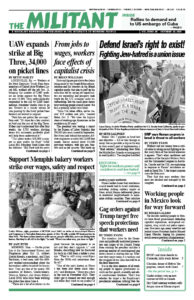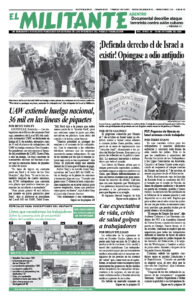November 2, 1998
LONDON — In a flagrant abuse of the national sovereignty of Chile, British police arrested the country’s former military dictator, Augusto Pinochet, Oct. 17 on a warrant issued by two Spanish judges.
The London Times pointed out that the arrest set a precedent by which other current or former heads of sovereign governments could be arrested when visiting Britain. Peruvian author Mario Vargas Llosa told the BBC he hoped it would be followed by the arrest of President Slobodan Milosevic of Yugoslavia and President Fidel Castro of Cuba. Speaking in Portugal, Castro said the “arrest was international meddling.”
The Communist League in the United Kingdom issued a statement condemning the arrest and extradition proceedings. “Only the Chilean people have the right to bring this butcher to justice, not the British or Spanish imperialists,” it read.
November 2, 1973
In June 1972 three writers — Maria Velho da Costa, Maria Isabel Barreno and Maria Teresa Horta — were arrested under Portuguese censorship laws for committing “an outrage to public morals and good customs.” Their crime: the publication of a 400-page book of essays, poetry and stories. The unifying theme of the now-banned book, New Portuguese Letters, is the oppression, degradation and isolation of contemporary women, and their cry for liberation.
The trial is scheduled to begin Oct. 25. They not only face two years’ imprisonment and a fine but the possibility of not being able to publish anything further under Portugal’s strict censorship regulations.
The three Marias also speak out against the Portuguese government’s wars in Africa. The authors solidarize themselves with the Africans who are fighting for control of their own destinies.
November 1, 1948
Over 300 people heard the presidential and vice presidential candidates of the Socialist Workers Party at an enthusiastic New York “Rally for a Socialist America” in the Hotel Diplomat on Oct. 27. James P. Cannon, national secretary of the SWP, struck the keynote for the evening with a short speech. In this one campaign of 1948, he said, more workers had heard our message than in the previous two decades.
The main speakers were Grace Carlson and Farrell Dobbs. Carlson, in a merciless attack on the capitalist parties, contrasted their record in favor of Big Business with the record of the SWP in fighting against reaction and for a better world.
SWP presidential candidate Dobbs said, “Not only will we have enduring peace, plenty and freedom under socialism, but for the first time, genuine civilization and the universal brotherhood of man will become possible.”

